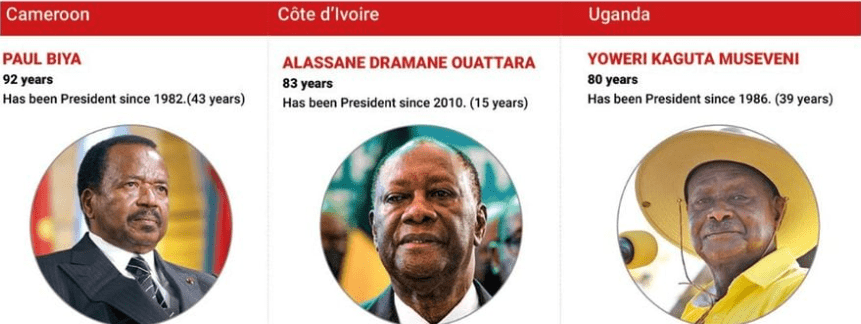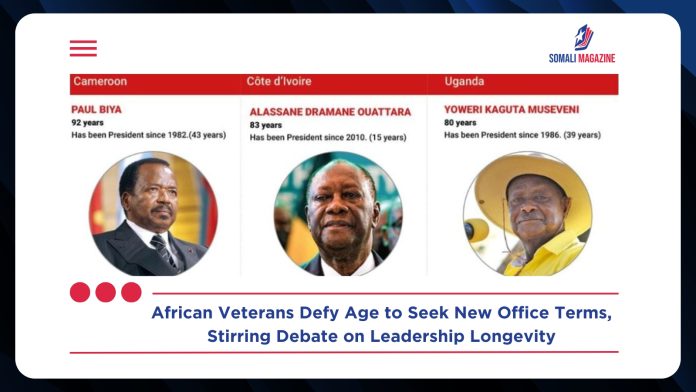Facebook Twitter (X) Instagram Somali Magazine - People's Magazine
African veterans defy age to seek new office terms, reigniting debate over leadership longevity and generational change as seasoned politicians across the continent announce fresh bids for power. From Uganda to Cameroon, long-serving leaders and former military figures are brushing off retirement calls and constitutional age limits to extend their political careers, often with the backing of loyal party structures and nostalgic supporters.
In Uganda, 80-year-old President Yoweri Museveni has accepted his party’s nomination to run in the 2026 elections, potentially extending his rule beyond four decades. Museveni, who came to power in 1986 as a rebel leader, has overseen constitutional amendments that removed both term and age limits, clearing the path for indefinite leadership. His supporters argue that experience and continuity are vital for Uganda’s development, while critics warn of democratic backsliding and generational stagnation.
Cameroon’s President Paul Biya, now 91, is also expected to seek another term despite growing concerns over his health and ability to govern. Biya, Africa’s oldest head of state, has ruled since 1982 and shows no signs of stepping down. His party, the Cameroon People’s Democratic Movement, continues to rally behind him, citing his legacy of stability, even as opposition voices call for reform and youth inclusion.
The trend isn’t limited to sitting presidents. Across Africa, retired generals, former ministers, and veteran lawmakers are returning to the political arena, often citing unfinished business or national duty. In Uganda, members of the National Resistance Movement Veterans League have publicly supported the removal of age caps, arguing that political turbulence has historically come from younger leaders.

Retired Major General Jim Muhwezi, a prominent voice in the debate, told lawmakers that age should not be a barrier to leadership. “Going by our history, the leaders that brought chaos were much younger than 75,” he said, referencing past coups and authoritarian regimes. His comments reflect a broader sentiment among some political elites that wisdom and experience outweigh youth and innovation.
However, public opinion across the continent tells a different story. According to Afrobarometer surveys conducted in 34 African countries, 76% of citizens support maximum age limits for heads of government, with the modal preference being 70 years. The surveys also show strong support for minimum age limits, suggesting that Africans want leaders who are neither too young nor too old.
Despite this, many countries have either abolished age limits or failed to enforce them, allowing ageing leaders to remain in power. In some cases, constitutional amendments have been passed to accommodate specific individuals, raising concerns about the erosion of democratic safeguards.
The debate over age and leadership is also playing out in electoral politics. In Nigeria, youth movements have called for presidential candidates under 60, while in Zimbabwe, 80-year-old President Emmerson Mnangagwa is seeking another five-year term. These contests highlight the tension between entrenched political figures and a rising generation eager for change.
As Africa’s population grows younger—with over 60% under the age of 25—the disconnect between leadership demographics and citizen expectations is becoming more pronounced. While veteran leaders tout their experience, many young Africans are demanding fresh ideas, inclusive governance, and accountability.
Whether the continent will see a shift toward younger leadership or continue to rely on its aging political class remains uncertain. For now, African veterans are defying age and convention, determined to shape the future as they have the past.

